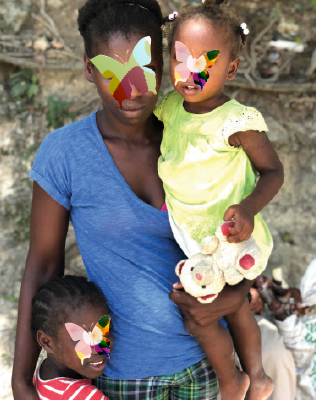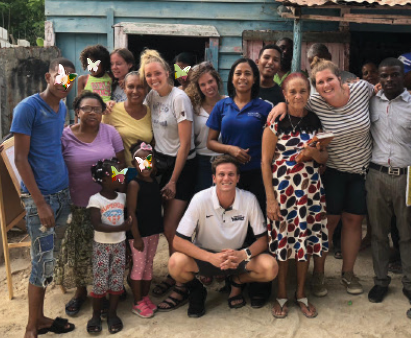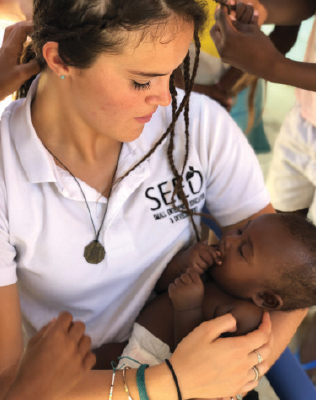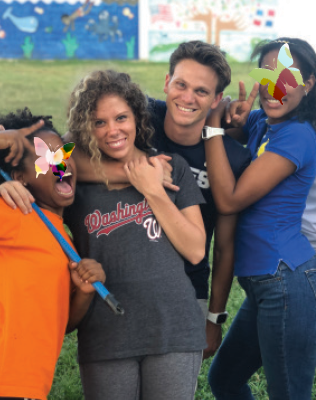The Business of Saving Lives
By Leta Baker
In the summer of 2018, a small group of Utah State University students prepared for a very special graduation ceremony. Only they were thousands of miles away from home. There were no caps and gowns. And they weren’t the ones graduating.

These USU students had just completed the first semester-long internship in the Dominican Republic enabled by a new partnership between the Jon M. Huntsman School of Business and Operation Underground Railroad (O.U.R.), a nonprofit that assists governments around the world in rescuing victims of human trafficking, with a special focus on children. The USU students’ internship involved working with individuals O.U.R. was supporting in aftercare to teach them entrepreneurial skills that would help set them on a path toward independence.
“Teaching entrepreneurship to people in developing nations, that’s not a new concept. What was different about the Dominican Republic was that the people we were teaching had survived these horrific situations,” said Michael Scott Peters, one of the first students to complete the internship with O.U.R. and watch the survivors he’d taught graduate from their training.
Facing the facts about human trafficking
At this very moment, tens of millions of people around the world are being subjected to the unthinkable indignities of human trafficking, which often involves sex trafficking. In India. Thailand. China. Russia. Mexico. Cambodia. Even right here in the United States of America. In fact, all over the United States of America.
It’s a situation that O.U.R.’s founder Tim Ballard became all too familiar with as a U.S. Department of Homeland Security investigator involved in rescuing children from trafficking in Latin America. His rescue missions were complicated by laws that prevented his team from saving children who weren’t directly connected to the U.S., which meant walking away from too many kids in desperate need of rescue. Ballard realized that he could save far more children and also facilitate their recovery if he started his own private organization for those purposes. So he founded Operation Underground Railroad in 2013.
O.U.R.’s team, which includes former CIA agents and Navy SEALs, among others, has already rescued over 2,800 survivors from trafficking and assisted in the arrest of over 1,500 traffickers in 23 countries, including the U.S.. But pulling someone out of slavery is just the first step toward freedom, and the road to recovery can be a complicated one. That’s especially true in situations where family members may have sold someone into slavery in the first place, and there’s no safe home to return to.
Building a life of independence
To help support the best possible outcomes for victims, O.U.R. provides safe housing and essential rehabilitation in carefully selected private orphanages and aftercare facilities. Those in O.U.R.’s care can count on food, shelter, and mental health therapy in a safe, secure environment. O.U.R. can also assist individuals with returning to school or finding work based on their interests and aptitudes.
If victims don’t have the skills to create a livable income, up to 80% are sexually exploited again after leaving aftercare.
— Tyler Schwab, O.U.R. Aftercare Assistant
“What we’ve found is that if victims don’t have the skills to create a livable income, up to 80% are sexually exploited again after leaving aftercare. This could be because after years of listening to their traffickers’ lies, that’s all they know and all they believe they’re worth,” said Tyler Schwab, O.U.R. Aftercare Assistant, “It’s clearly not true, but when someone has been exploited for so long, they remain vulnerable to others who would abuse and objectify them for financial gain.”
>It was a close call for Mindy and her mother, both victims of trafficking in Central America. Mindy was just seven when her father started sexually exploiting her. Her mother had already been forced into a life of exploitation in a treacherous red-light zone, where Mindy was eventually trapped and violated as well. After a time, her mother found an O.U.R.-supported aftercare center that eventually helped both of them find freedom far from the traffickers who had abused them. This involved Mindy’s mother participating in 12 weeks of classes on how to create her own small business, which helped her take positive steps in a new direction.
Students empowering students

Thanks to a new partnership with the Huntsman School’s Small Enterprise Education & Development (SEED) Program and the nonprofit, Mentors International, O.U.R. has added entrepreneurial training to the list of ways it can instill confidence and hope in those who need it most. In the fall of 2017, O.U.R. teamed up with SEED in Lima, Peru to provide entrepreneurial education to victims interested in starting their own small businesses and also partnered with Mentors International to provide funding where appropriate. The following summer, the three organizations expanded their joint efforts working with survivors of trafficking in the Dominican Republic.
“Our expertise at O.U.R. is maintaining strong diplomatic relationships with foreign governments, supporting undercover operations and creating holistic aftercare services to help survivors of human trafficking heal. So we knew that partnering with the USU SEED program and Mentors International would be vital to rounding out what we could offer survivors. These two organizations are the experts in business, micro-financing and ongoing mentorship, and their curriculum and support have proven successful around the world. We’re honored to be able to share their expertise with the individuals we rescue and support in aftercare,” said Schwab.
Every semester, a growing number of qualified USU students apply for this life-changing internship opportunity, but only a handful are selected. Those accepted begin by spending a semester in intensive training on entrepreneurship and cultural studies with the SEED Program. The following semester, they put their expertise to work alongside O.U.R. in the Dominican Republic or Peru (with more countries to come next year)—or with other partner organizations in countries like Ghana, the Philippines, Peru and Guatemala. These students’ efforts have already proven to reduce poverty, increase self-sufficiency and improve standards of living for those in dire need.
The proof is in the payoffs
So, what exactly can a 19-year-old college student teach a survivor of human trafficking about starting a successful business from scratch? For starters, how to tap into strengths and interests like preparing food, sewing clothing, or styling hair. How to market a business’s offerings. Secure and repay a loan. Save and spend responsibly. And so on. It all adds up to significant life improvements that can change someone’s course in permanent and powerful ways.
On average, household income doubles after individuals work with our SEED interns and the Mentors International team to get consulting and funding help.
— Dr. Mike Glauser, Director of the USU Center for Entrepreneurship
“We did a study about a year ago that showed that on average household income doubles after individuals work with our SEED interns and the Mentors International team to get consulting and funding help,” said Dr. Mike Glauser, Director of the USU Center for Entrepreneurship, “They also eat more nutritious foods because they’re able to buy more fruits and vegetables. Those with children may now be able to send them off to school. They may even be able to buy their first home or a car.”
USU SEED Program interns have already helped set up successful businesses ranging from pharmacies and stores to bakeries and cafes, among many others. And when one group of interns wraps up their semester in a given country, they leave detailed notes for the next group on their way in. At the same time, departing students often continue the family-like relationships they established with the people they taught through online message groups after returning home.
Business as a force for good.
“In the corporate world, companies compete with each other, copy one another’s products and services, and fight for market share. Some nonprofits do, too. But we believe we can create more effective solutions by growing existing infrastructures and establishing partnerships that allow us to each do what we do best for the greater good,” said Glauser.

That’s exactly what O.U.R., the SEED program, and Mentors International are doing together. But none of these organizations could do it without support from individuals and organizations like the Malouf Foundation, the charitable arm of Malouf corporation, which has partnered with O.U.R. to fight child exploitation since 2017.
“We’re taking a holistic approach to being a good, responsible company that makes a difference in the world,” said Jake Neeley, philanthropy and communications director at the Malouf Foundation, “Of course, we’re a business, so it takes profits to keep the lights on and make all of this possible. But through our business, we’re positively impacting the lives of those who have been trafficked, abused or exploited, and also looking out for the planet through our supply chain and sustainable products.”
Led by USU graduates, Malouf is an example of an organization so devoted to doing good that it’s working toward becoming a Certified B Corporation, a new category of business that considers purpose and profit side by side. Fewer than 3,000 companies have earned this esteemed badge of social responsibility so far. But it’s a decision that aligns with the times—and particularly when the majority of the worldwide workforce is made up of Millennials and Generation Z.
A generation of change-makers.
According to the Deloitte Global Millennial Survey 2019, almost half of Millennials (born between 1983 and 1994) and members of Generation Z (born between 1995 and 2002) are drawn to “making a positive impact on their communities and society.” They want organizations they work for and spend money with to have values that align with theirs, and to prove that they’re helping to solve the world’s problems. This syncs up well with feelings shared by USU SEED interns who have worked alongside O.U.R. and Mentors International.
“College can sometimes be a selfish time in our lives. It can feel like it’s all about my schoolwork, my career, my problems. I loved forgetting about myself and just going out and helping other people through the SEED Program,” said USU junior Marissa Barlow, an outdoor product design major who started Nani Swimwear while still in high school. Barlow had such a meaningful experience during her first SEED internship in the Philippines in 2018 that she paid her own way to participate in a second SEED internship in the Dominican Republic with O.U.R. in 2019.

USU believes that everyone can benefit from entrepreneurial skills, so the SEED program is open to all USU students. More than 300 students (about 100 per year) representing 50+ majors have participated so far, with nearly half of participants coming from non-business majors. That has included pre-med, graphic design, psychology and music majors, among many others, and even select students from other Utah-based universities.
“Not only do you not need a business background to participate, but it’s actually not an expensive internship,” said Josh Evans, a recent SEED intern, “Thanks to funding from donors to the SEED program, this opportunity actually costs less than a semester of school.”
Better outcomes for everyone involved.
“We tend to hear two things from students who participate in this program,” said Glauser, “First, they realize that they’ve absolutely won the lottery in terms of the circumstances they landed in on earth. And second, they realize there are lots and lots of needs in the world that they knew absolutely nothing about and that they want to do something about.”
Jessica Mass, International Director of Aftercare at O.U.R., has been doing something about human trafficking for much of her 18-year career in the nonprofit sector. And she’s now spent over four years developing strategic aftercare partnerships for O.U.R in over 20 countries. Jessica has seen teenage girls come into O.U.R.’s care with children of their own due to having been trafficked. So the education and professional training that O.U.R., SEED and Mentors International offer have the power to not only improve survivors’ lives, but also their children’s.
Almost half of Millennials and members of Generation Z are drawn to “making a positive impact on their communities and society.” They want organizations they work for and spend money with to have values that align with theirs, and to prove that they’re helping to solve the world’s problems.
— Deloitte Global Millennial Survey 2019
One young victim told O.U.R. that there was no hope for her, and that the only way she’d ever be able to survive and feed her children was at the hands of traffickers. Jessica told her O.U.R. would support her in finding a better path, and the young woman was so determined to try that she got up at 4 a.m. every day and took several buses to get to the 12-week business classes. O.U.R. was there when she graduated from the program. They were there to help her buy what she needed to start her own store. And they were there when she decided to go back to school and take her administrative education even further.
“She said that, to her, the beauty of it all was that it wasn’t just her life that had been changed. Her children’s lives were also forever changed. The cycle of slavery had been broken, and no trafficker could prey on the fact that she didn’t have enough money for her family’s basic needs,” said Mass, “This is about holistic healing and empowerment. It’s about teaching survivors they’re not victims for life and that we’ll be right there with them as they gain the skills they need to provide for themselves and their families. We may give them the tools, but they’re the fighters, the thrivers—the ones who have the power. If there’s any hero in this, it’s the survivor.”
USU students are being changed for the better as well due to SEED’s partnership with O.U.R. and Mentors International. “I’ve learned way more in the last three months than I’ve learned in any class in my three years of college so far,” said Bannon Greer, a spring 2019 SEED intern in the Dominican Republic, “It’s a completely different story when you’re applying these concepts in the real world and seeing how they work with real people in real situations. And just as we’re mentoring people and cheering them on as they go, they’re helping us reinforce these business principles and gain confidence along the way.”
One principle this partnership exemplifies is the power of business as a force for good. For corporations, that can mean giving a percentage of profits a newfound purpose. For SEED students, it can mean greater awareness and confidence, and a head start on a meaningful career. And for victims of human trafficking, that can mean a whole new life of freedom and self-reliance.


